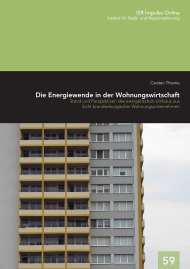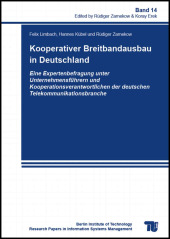Die Energiewende in der Wohnungswirtschaft
Stand und Perspektiven des energetischen Umbaus aus Sicht brandenburgischer Wohnungsunternehmen

Publishing year: 2016
The paper discusses the progress of the energy transition on the housing market of Brandenburg and therein focuses on the specifics of municipal and cooperative housing companies. According to governmental initiatives within the official energy strategy 2030 these protagonists shall commit themselves strongly in the state’s climate protection campaign. Taking into consideration that regional disparities and socio-demographic characteristics are a main limiting factor for broad energy-related investments on the local housing sector the following analysis identifies principal restraints and requirements for the future development of the building stock. In order to boost a broad renewal process a new planning approach which targets the growing use of renewable energies as well as progressive energy systems and their potential for energy-related innovations on the spatial scale of urban quarters is currently being implemented throughout municipalities. The key concept of energy-related reconstructive measures established in the paper therefore extends the sole building-related view onto the infrastructural complex of energy supply. Comprehensive data on the current energy consumption and the energy resp. heat supply of nearly 21,500 housing units across Brandenburg was acquired with an online survey. Additionally detailed information is provided by a qualitative inquiry and several interviews with local housing experts. The results of the investigation show clearly that short-term improvements can hardly be achieved with another set of major redevelopment measures. Given the progress already made by the housing companies, the opportunities for further efficiency measures are limited. However, already energetically qualified building stock may still present potential. For instance demand-oriented redevelopment projects for age-appropriate services can also be combined with energetically efficient technology-based measures. Another key aspect of the study are specific challenges that housing companies in shrinking regions like Brandenburg have to face concerning the evaluation and feasibility of energy measures in terms of efficiency, social compatibility, energy efficiency and their environmental impact. With focus on the demographic changes and structural deficits on Brandenburg’s housing market the further development needs of the energy transition in typical regional residential areas are being identified.



